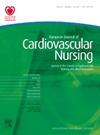接受经导管主动脉瓣植入术的主动脉瓣狭窄患者的虚弱反应:群组随机对照试验(FRAIL-AS 反应试验)方案
IF 3.9
3区 医学
Q2 CARDIAC & CARDIOVASCULAR SYSTEMS
引用次数: 0
摘要
背景接受经导管主动脉瓣植入术(TAVI)的重度主动脉瓣狭窄患者中,每十人中就有三人身体虚弱。体弱与患者术后的不良预后相关,如1年死亡率升高、不良事件增加、住院时间延长和生活质量下降。尽管对这类人群进行循证虚弱管理迫在眉睫,但这方面的研究却很有限。方法 在 10 家医院的 TAVI 项目中对接受瓣膜置换术的主动脉瓣狭窄虚弱患者实施 "虚弱应对计划 "干预的可行性进行试点、分组随机对照试验评估。干预措施包括实施策略和虚弱反应临床协议,重点是营养不良识别、患者教育、全科医生通知、老年病综合评估和心脏康复。符合条件的医院将被随机分配(1:1)接受干预或对照(标准护理)。主要结果:确定虚弱后接受营养评估的患者比例。次要结果包括死亡率和入院率、虚弱程度改善情况、生活质量和循证虚弱管理。实施结果将通过过程评估进行评估。讨论 该试验旨在缩小接受 TAVI 的主动脉瓣狭窄患者体弱识别与实施循证体弱管理实践之间的差距,以改善患者预后和护理质量。本文章由计算机程序翻译,如有差异,请以英文原文为准。
Frailty response in patients with aortic stenosis undergoing transcatheter aortic valve implantation: protocol for a pilot, cluster randomised controlled trial (FRAIL-AS Response Trial)
Background Three in ten severe aortic stenosis patients undergoing transcatheter aortic valve implantation (TAVI) are frail. Frailty correlates with adverse post-procedure patient outcomes, such as higher 1-year mortality, increased adverse events, prolonged hospital stays, and diminished quality of life. Despite the urgency for evidence-based frailty management in this population, research in this area is limited. Methods A pilot, cluster randomised controlled trial to assess the feasibility of implementing a Frailty Response Program intervention in 10 hospital TAVI programs for frail patients with aortic stenosis undergoing valve replacement. The intervention includes an implementation strategy and a Frailty Response Clinical Protocol, focused on malnutrition identification, patient education, general practitioner notification, comprehensive geriatric assessment, and cardiac rehabilitation. Eligible hospitals will be randomised (1:1) to either the intervention or control (standard care). Primary outcome: proportion of patients receiving nutritional assessment upon frailty identification. Secondary outcomes include mortality and hospital admissions, frailty improvement, quality of life, and evidence-based frailty management. Implementation outcomes will be evaluated through a process assessment. Discussion The trial aims to bridge the gap between the recognition of frailty in patients with aortic stenosis undergoing TAVI and the implementation of evidence-based frailty management practices to improve patient outcomes and care quality.
求助全文
通过发布文献求助,成功后即可免费获取论文全文。
去求助
来源期刊

European Journal of Cardiovascular Nursing
CARDIAC & CARDIOVASCULAR SYSTEMS-NURSING
CiteScore
5.10
自引率
10.30%
发文量
247
审稿时长
6-12 weeks
期刊介绍:
The peer-reviewed journal of the European Society of Cardiology’s Council on Cardiovascular Nursing and Allied Professions (CCNAP) covering the broad field of cardiovascular nursing including chronic and acute care, cardiac rehabilitation, primary and secondary prevention, heart failure, acute coronary syndromes, interventional cardiology, cardiac care, and vascular nursing.
 求助内容:
求助内容: 应助结果提醒方式:
应助结果提醒方式:


